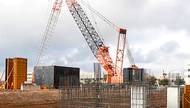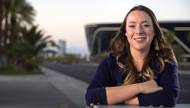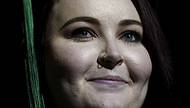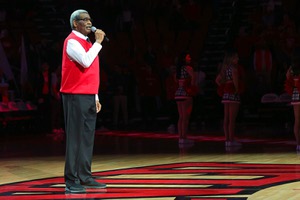Starting any job amid a pandemic can be daunting, but imagine if the position involved leading a new medical school.
Dr. Marc J. Kahn, who arrived at UNLV on April 1, 2020, has it covered. The dean of UNLV’s School of Medicine—which received full accreditation last month—and its vice president for Health Affairs is busy overseeing educational programs, clinical care, research and community engagement. He’s developing collaborations between the medical school and other departments, like the School of Fine Arts and the Business School. And he’s helping create an academic health center that will provide community care and drive research.
Khan, 59, took time from his busy schedule to speak to the Weekly about his COVID-19 response, overcoming Las Vegas’ health challenges and more.
Las Vegas has obviously struggled since COVID-19 appeared. Why should folks here feel optimistic?There is a light at the end of the tunnel with this pandemic. … We need to do a better job of getting vaccines to people, but vaccination is going to get us to the end of this pandemic. So that’s a reason for optimism.
The second reason is that we have a new medical school in Las Vegas. We’re looking forward to bringing new technologies and physicians who can bring new knowledge to the Valley. … The pandemic nationally has shown us what happens when you have the health care disparities that we have. I’m optimistic that moving forward, we’re going to better address those health care disparities.
Finally, we’ve learned how to do telehealth, something that clearly came out of the pandemic.
How have you and UNLV been involved in battling COVID-19? We were the first out of the chute to do testing, regardless of one’s ability to pay. … We were the first to [set up a convalescent plasma program] in the state. We’ve vaccinated 19,000 people; we are a point of distribution. This summer, we purchased two minus-80-degree freezers, which is necessary for the Pfizer vaccine. ... And we’re educating the community.
Did you ever think you’d witness a pandemic in your lifetime?All in all, I’m not that surprised. [In] medical school you read about the influenza outbreak in 1918. You knew it was going to happen; it was just a matter of when. It’s scary and unfortunate, but this will not be the last pandemic that the human species sees. It’s just the nature of the beast.
What’s the latest with the new medical school building? I just visited the site with the governor, because he announced he was going to restore the $25 million committed by the state for construction. The building is ahead of schedule. The building’s really going to change the landscape of the Las Vegas Medical District.
Have you heard the joke about how the airport is where sick Las Vegans go to get better?Many times, and I’ve promised never to repeat it, because our job is to make that an old adage. We need to—as a medical school and an academic health center—really get to the point where we’re able to do everything in our community that’s part of modern health care, and do it at a lower cost and higher quality than anybody else.
Other than the pandemic, what are the biggest health challenges facing Southern Nevada?We have great disparities in health care here. As in other cities, life expectancy can almost be predicted by a ZIP code. We have to do a better job of providing good care to everyone.
Why did you choose to become a doctor? And why did you embrace a leadership role?I liked science, and I liked the idea of taking care of people. As far as leadership, when I was 14, I lied about my age, got a job in a restaurant and was promoted. I was a manager of the restaurant when I was in high school.
Becoming a medical school dean, especially in a newer school, was the dream job, because you could actually create something. You didn’t have the silos that existing medical schools have. You could actually do something a little different that perhaps makes more sense to educate the physicians of the future.
How can you keep medical students in the local community once they become doctors?We’re careful with our selection process, that the students that we admit at UNLV have a connection to Nevada. … [It’s] making sure they have a good experience when they’re here as students, so they either come back or stay.
You led Tulane University’s med school during the aftermath of Hurricane Katrina, moving students 350 miles from New Orleans to Houston for a full academic year. What was that like?Something like that had never happened before. Fortunately, it worked. It was a great learning experience. I guess I’ve been through disasters, and this is yet another one. It’s very different, because unlike Katrina, which was very local, this is a global event. We don’t have to tell people about COVID; they know about it.
As a newcomer, what have you discovered about Las Vegas that you like? I haven’t really spent time in casinos yet because of COVID. Even though I’m vaccinated, I think we still need to practice those public health measures.
I really like the people of Las Vegas; I like their attitude. I like the fact that they’re individualistic. … I really like to get outdoors and hike; there are some great places to hike here. And I just look forward to the medical school and academic health center continuing to grow and be a vital part of the Las Vegas community.





